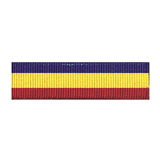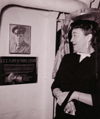|

The FLOYD B PARKS was named in honor of Major Floyd Bruce
Parks, U.S. Marine Corps, who was born in Salisbury, Missouri,
January 16, 1911. He was appointed a midshipman to the Naval
Academy in June 1930. Graduated and appointed a Second Lieutenant
in the U.S. Marine Corps in June 1934. He progressed in grade
until his promotion to Major, May 16, 1942.
After graduation from the Academy, Major Parks had duty at
the Navy Yard, Philadelphia, Pennsylvania for a year before
he joined the USS ASTORIA. In May 1936 he reported to the
Naval Air Station, Pensacola, Florida for flight training.
While in training there, Major Parks, aided by an enlisted
man, rescued a private from drowning and won the commendation
of his superior officers for "quick action, good judgment
and swimming ability".
Designated naval aviator June 12, 1937, Major Parks had duty
at the Naval Air Station, San Diego, California from August
of that year until June 1940 when he returned to the Pensacola
Air Station for duty. In May 1941, he was transferred to the
First Marine Aircraft Wing, Fleet Marine Force, Quantico,
Virginia, and served in that assignment until March 1942,
when he joined the Second Marine Aircraft Wing at San Diego,
California, and later was sent to the Pacific combat zone.
For his services in command of Marine Fighting Squadron 221
during the Battle
of Midway
in June 1942, Major Parks was awarded the Navy Cross
with the following citation:

"For extraordinary heroism and conspicuous devotion
to duty as Squadron Commander for Marine Fighting Squadron
TWO TWENTY-ONE, in action against enemy Japanese forces during
the Battle of Midway, June 4, 1942. Leading his squadron in
a dauntless and aggressive attack against a vastly superior
number of Japanese bomber and fighter planes, Major Parks
aided in disruption the plans of the enemy and lessening the
effectiveness of their attack, thereby contributing materially
to the success of our forces. As a result of his courageous
and daring tactics and because of the circumstances attendant
upon this engagement, there can be little doubt that Major
Parks gallantly gave up his life in the service of his country.
He displayed the characteristics of a fine leader and excellent
airman in keeping with the highest traditions of the United
States Naval Service."
Major Parks was also entitled to a
facsimile of, and the Ribbon for the Presidential Unit Citation
awarded Marine Aircraft Group 22 for action in that battle.
The citation follows:

"For
conspicuous courage and heroism in combat at Midway Island
during June, 1942. Outnumbered five to one, Marine Aircraft
Group Twenty-Two boldly intercepted a heavily escorted enemy
bombing force, disrupting their attack and preventing serious
damage to island installations. Operating with half of their
dive-bombers obsolete and in poor mechanical conditions, which
necessitated vulnerable glide bombing tactics, they succeeded
in inflicting heavy damage on Japanese surface units of a
large enemy task force. The skill and gallant perseverance
of flight and ground personnel of Marine Aircraft Group Twenty-Two,
fighting under tremendously adverse and dangerous conditions
were essential factors in the unyielding defense of Midway."
Following the battle of
Midway, Major Parks was listed as missing in action, June
4, 1942, and was officially declared dead June 5, 1943.
In addition to the Navy Cross, the Purple Heart Medal, and
the Presidential Unit Citation Ribbon, Major Parks had the
American Defense Service Medal and the Asiatic-Pacific Area
Campaign Medal.
His next of ken, is his wife Mrs. Floyd B. Parks of 3506 Mountain
Avenue, El Paso, Texas.

Above
information retrieved from the National Archives and Navy
Yards by
Oscar
Boudreaux, Jr.. The Parks Association thanks you for your
contribution.
updated 7/28/05 |

